
It’s a great pleasure and honor to be here to participate in the launch of a major new area of cooperation among the federal and regional ministries of health, the Ministry of Education, training institutions and USAID to strengthen human resources for health.
U.S. Government support to training health professionals in Ethiopia is not new, however, and actually started here in Amhara, back in 1954, in collaboration with the World Health Organization (WHO), to establish and provide faculty to the Gondar College of Public Health. At that time the focus was on training to respond to severe malaria epidemics in Ethiopia. Today, the college and training center continue and lead health science education as part of the University of Gondar.
Strengthening Human Resources for Health will develop a health workforce to continue advances in the battle to wipe out malaria and play a pivotal role in reducing maternal and child mortality, in delivering quality health care services, and preventing and treating HIV/AIDS. U.S. Presidential initiatives on malaria and HIV/AIDS (known by the acronym PEPFAR) are contributing funding to this USAID program and underscore its strategic importance to development of a sustainable health system for Ethiopia. Human Resources for Health is a priority for the government of Ethiopia and for our cooperation under the U.S. Global Health Initiative and the American people are investing $55 million dollars over five years.
Our expert implementing partners for this project led by Jhpiego and complemented by Management Sciences for Health (MSH), Ethiopia Midwives Association (EMA), Ethiopia Association of Anesthetists (EAA) and Open University will work closely with the Ministry and regional health bureaus, public health educational institutions and vocational training schools to address the underlying causes of poor quality health services. These underlying causes include: a severe shortage of trained health workers such as doctors, midwives, anesthetists, health extension workers and other types of essential personnel, poor distribution of health workers across the country, and retention of health workers in hardship areas of the country. Furthermore, capable managers are needed to address workforce motivation and evaluation and to oversee a regulatory system for licensing which is critical to developing, managing and retaining competent health workers.
I am proud that USAID can contribute to the Human Resource Strategic Plan of the Ministry of Health and address these challenges through the support of this new project whose design has benefitted from the vision of Minister Tedros.
Strengthening Human Resources for Health will:
-
Improve the quality of academic and professional training at all levels of the health workforce, improve personnel management and thus increase retention and productivity of health professionals.
-
HRH will expand the health workforce by expanding pre-service education, in-service training and continuing professional development and provide opportunities for career advancement.
HRH plans to train over 5,500 midwives, over 2,000 anesthetists, and over 8,000 health extension workers. Current health workers will be upgraded through in service training and new postgraduate programs in human resource management will be established.
Most importantly, by increasing the number of skilled and proficient health professionals who will prevent the needless deaths of mothers and children, the HRH project will ultimately contribute toward Ethiopia’s attainment of Millennium Development Goals 4 and 5: to reduce the deaths of children under five and of mothers in childbirth.
HRH is designed to support Ethiopia’s goals for producing a responsive and productive health workforce and will help sustain advances achieved in the health sector and provide great opportunities to health workers at all levels. Health systems strengthening for the long term is one of the priorities of the U.S. Government’s Global Health Initiative. The U.S. Government, through the work of USAID, and the Centers for Disease Control (CDC), invests the largest share of its support for development in Ethiopia in health. This new Human Resources for Health program will help ensure that investment lasts and benefits the majority of the Ethiopian people.
I’ll close by extending my sincerest best wishes for the success of this program and your collaboration across regions and between the health and education sectors. The well-being of Ethiopians, the professional pride and achievements of the health workforce, and the progress of the country depends on our collective efforts to achieve excellence in health care.
See also
Remarks by USAID Mission Director Dennis Weller [PDF, 249 KB]
Related Resources
USAID Ethiopia: Global Health Initiative
USAID Ethiopia: President’s Emergency Plan for AIDS Relief (PEPFAR)
USAID Ethiopia: Health Systems
USAID Ethiopia: President’s Malaria Initiative







Comment
Make a general inquiry or suggest an improvement.